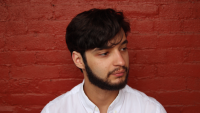Daniel Malinsky

Assistant Professor, Biostatistics
Dr. Malinsky studies the methodology of causal inference. His research interests include topics which bridge statistics and machine learning, such as causal discovery, and the development of novel inference methods to answer pressing public health questions, such as the effects of air pollution on health and the mechanisms underlying health disparities. He also works in “algorithmic fairness”: understanding and counteracting the biases introduced by data science tools deployed in socially-impactful settings, including hospitals. Dr. Malinsky earned his BA at Columbia and his PhD at Carnegie Mellon University. Before joining the Mailman School of Public Health, he was a postdoctoral fellow at Johns Hopkins University.
You have a rather diverse academic background. Can you describe your path to biostatistics, and what eventually drew you there?
As an undergraduate, I was interested in a bunch of different things: science, music, politics, etc. I thought initially that I would probably end up a physicist, and I even had the opportunity to spend a summer at the Large Hadron Collider in Geneva. However, at the same time, I was feeling intellectually distracted by two things: 1) physics seemed divorced from really pressing social/political policy issues, and 2) I was encountering, by chance, perplexing foundational questions about scientific methodology, e.g., what is “the right way” to draw conclusions from data and what principles, if any, may underlie these inferences? I eventually decided to attend the graduate program in “Logic, Computation, and Methodology” at Carnegie Mellon, where I was exposed to a unique mix of philosophy, math, statistics, computer science, and social sciences. I studied causality from a number of different perspectives, ranging from very abstract to computational with an eye towards how methodological choices have an impact on policy debates. Then, as a postdoc at Johns Hopkins, I had more direct interactions with the world of biostatistics, where these interests came together in a new way for me. I realized that in biostatistics I could combine policy-relevance and methodology in way that was natural: we care about people’s well-being and health, we use empirical methods to learn about the best ways of acting (treatments, interventions, policies), and these things are related since better or more robust methods can contribute (we hope) to better policy decisions.
You grew up in the New York City area, and are an alumnus of Columbia College. How does it feel to return to New York and to Columbia?
It feels surreal, but also very nice. Taking on the role of faculty at a place where I was once (it feels long ago) a student will definitely be an adjustment. I am a big fan of New York City, and of course happy to be here, near most of my family.
What are your interests outside of work?
I like music, and have really been missing the concert experience in these Covid pandemic days. I also perform sometimes, mostly in the world of “experimental” electronic/electroacoustic music.